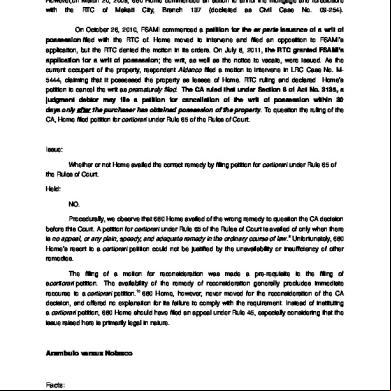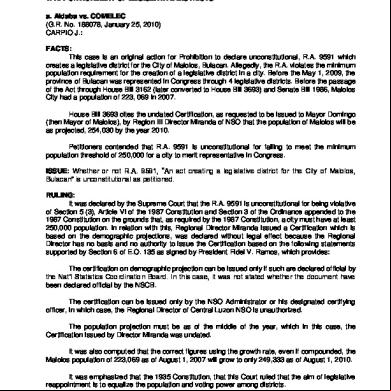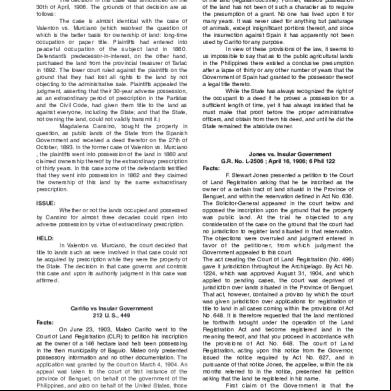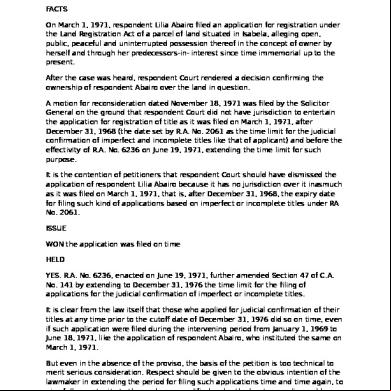Digests Part 2 175d70
This document was ed by and they confirmed that they have the permission to share it. If you are author or own the copyright of this book, please report to us by using this report form. Report 3b7i
Overview 3e4r5l
& View Digests Part 2 as PDF for free.
More details w3441
- Words: 1,214
- Pages: 3
Home Appliances Inc versus CA, GR No. 206599, September 29, 2014 Facts: FSAMI consolidated its ownership after 680 Home failed to redeem the property which was forclosed previously. A new certificate of title (TCT No. 227316) was issued in FSAMI’s name. However,on March 20, 2009, 680 Home commenced an action to annul the mortgage and foreclosure with
the
RTC
of
Makati
City,
Branch
137
(docketed
as
Civil
Case
No.
09-254).
On October 26, 2010, FSAMI commenced a petition for the ex parte issuance of a writ of possession filed with the RTC of. Home moved to intervene and filed an opposition to FSAMI’s application, but the RTC denied the motion in its orders. On July 8, 2011, the RTC granted FSAMI’s application for a writ of possession; the writ, as well as the notice to vacate, were issued. As the current occupant of the property, respondent Aldanco filed a motion to intervene in LRC Case No. M5444, claiming that it possessed the property as lessee of Home. RTC ruling and declared Home’s petition to cancel the writ as prematurely filed. The CA ruled that under Section 8 of Act No. 3135, a judgment debtor may file a petition for cancellation of the writ of possession within 30 days only after the purchaser has obtained possession of the property. To question the ruling of the CA, Home filed petition for certiorari under Rule 65 of the Rules of Court.
Issue: Whether or not Home availed the correct remedy by filing petition for certiorari under Rule 65 of the Rules of Court. Held: NO. Procedurally, we observe that 680 Home availed of the wrong remedy to question the CA decision before this Court. A petition for certiorari under Rule 65 of the Rules of Court is availed of only when there is no appeal, or any plain, speedy, and adequate remedy in the ordinary course of law.8 Unfortunately, 680 Home’s resort to a certiorari petition could not be justified by the unavailability or insufficiency of other remedies. The filing of a motion for reconsideration was made a pre-requisite to the filing of acertiorari petition. The availability of the remedy of reconsideration generally precludes immediate recourse to a certiorari petition.10 680 Home, however, never moved for the reconsideration of the CA decision, and offered no explanation for its failure to comply with the requirement. Instead of instituting a certiorari petition, 680 Home should have filed an appeal under Rule 45, especially considering that the issue raised here is primarily legal in nature.
Arambulo versus Nolasco
Facts: Petitioners herein filed a petition for relief under Article 491 of the Civil Code with the RTC of Manila, alleging that all of the co–owners, except for respondents, have authorized petitioners to sell their respective shares to the subject properties; that only respondents are withholding their consent to the sale of their shares; that in case the sale pushes through, their mother and siblings will get their respective 1/9 share of the proceeds of the sale, while respondents will get ¼ share each of the 1/9 share of Iraida; that
the sale of subject properties constitutes alteration; and that under Article 491 of the Civil Code, if one or more co–owners shall withhold their consent to the alterations in the thing owned in common, the courts may
afford
adequate
relief.4
In their Answer, respondents sought the dismissal of the petition for being premature. Respondents averred that they were not aware of the intention of petitioners to sell the properties they co–owned because they were not called to participate in any negotiations.
ISSUE: Whether respondents, as co–owners, can be compelled by the court to give their consent to the sale of their shares in the co–owned properties. HELD: Article 493 of the New Civil Code dictates that each one of the parties herein as co–owners with full ownership of their parts can sell their fully owned part. The sale by the petitioners of their parts shall not affect the full ownership by the respondents of the part that belongs to them. Their part which petitioners will sell shall be that which may be apportioned to them in the division upon the termination of the co–ownership. With the full ownership of the respondents remaining unaffected by petitioners’ sale of their parts, the nature of the property, as co–owned, likewise stays. In lieu of the petitioners, their vendees shall be co–owners with the respondents. From the foregoing, it may be deduced that since a co–owner is entitled to sell his undivided share, a sale of the entire property by one co–owner without the consent of the other co–owners is not null and void. However, only the rights of the co–owner–seller are transferred, thereby making the buyer a co–owner of the property.
Roque versus Aguado, April 7, 2014 Facts: (Sps. Roque) and the original owners of the then uned Lot 18089 –Rivero, et al executed a Deed of Conditional Sale of Real Property 6 (1977 Deed of Conditional Sale) over a 1,231-sq. m. portion of Lot 18089. Fructuoso Sabug, Jr. (Sabug, Jr.), former Treasurer of the National Council of Churches in the Philippines (NC), applied for a free patent over the entire Lot 18089 and was eventually issued Original Certificate of Title. Later, Sabug sold the lot to Aguad who mortgaged the lot to secure his loan from LBP. Sps. Roque filed a complaint15 for reconveyance, annulment of sale, deed of real estate mortgage, foreclosure, and certificate of sale, and damages before the RTC. , Aguado raised the defense of an innocent purchaser for value as she allegedly derived her title (through the 1999 Deed of Absolute Sale) from Sabug, On the other hand, Land Bank averred that it had no knowledge of Sps. Roque’s claim relative to the subject portion, considering that at the time the loan was taken out, Lot 18089 in its entirety was ed in Aguado’s name and no lien and/or encumbrance was annotated on her certificate of title. CA did not order its reconveyance or segregation in the latter’s favor because of Sps. Roque’s failure to pay the remaining balance of the purchase price.
ISSUE: Whether or not the CA erred in not ordering the reconveyance of the subject portion in Sps. Roque’s favor.
HELD: NO. The essence of an action for reconveyance is to seek the transfer of the property which was wrongfully or erroneously ed in another person’s name to its rightful owner or to one with a better right.49 Thus, it is incumbent upon the aggrieved party to show that he has a legal claim on the property superior to that of the ed owner and that the property has not yet ed to the hands of an innocent purchaser for value. Here, it is undisputed that Sps. Roque have not paid the final installment of the purchase price. As such, the condition which would have triggered the parties’ obligation to enter into and thereby 57
perfect a contract of sale in order to effectively transfer the ownership of the subject portion from the sellers (i.e., Rivero et al.) to the buyers (Sps. Roque) cannot be deemed to have been fulfilled. Consequently, the latter cannot validly claim ownership over the subject portion even if they had made an initial payment and even took possession of the same
the
RTC
of
Makati
City,
Branch
137
(docketed
as
Civil
Case
No.
09-254).
On October 26, 2010, FSAMI commenced a petition for the ex parte issuance of a writ of possession filed with the RTC of. Home moved to intervene and filed an opposition to FSAMI’s application, but the RTC denied the motion in its orders. On July 8, 2011, the RTC granted FSAMI’s application for a writ of possession; the writ, as well as the notice to vacate, were issued. As the current occupant of the property, respondent Aldanco filed a motion to intervene in LRC Case No. M5444, claiming that it possessed the property as lessee of Home. RTC ruling and declared Home’s petition to cancel the writ as prematurely filed. The CA ruled that under Section 8 of Act No. 3135, a judgment debtor may file a petition for cancellation of the writ of possession within 30 days only after the purchaser has obtained possession of the property. To question the ruling of the CA, Home filed petition for certiorari under Rule 65 of the Rules of Court.
Issue: Whether or not Home availed the correct remedy by filing petition for certiorari under Rule 65 of the Rules of Court. Held: NO. Procedurally, we observe that 680 Home availed of the wrong remedy to question the CA decision before this Court. A petition for certiorari under Rule 65 of the Rules of Court is availed of only when there is no appeal, or any plain, speedy, and adequate remedy in the ordinary course of law.8 Unfortunately, 680 Home’s resort to a certiorari petition could not be justified by the unavailability or insufficiency of other remedies. The filing of a motion for reconsideration was made a pre-requisite to the filing of acertiorari petition. The availability of the remedy of reconsideration generally precludes immediate recourse to a certiorari petition.10 680 Home, however, never moved for the reconsideration of the CA decision, and offered no explanation for its failure to comply with the requirement. Instead of instituting a certiorari petition, 680 Home should have filed an appeal under Rule 45, especially considering that the issue raised here is primarily legal in nature.
Arambulo versus Nolasco
Facts: Petitioners herein filed a petition for relief under Article 491 of the Civil Code with the RTC of Manila, alleging that all of the co–owners, except for respondents, have authorized petitioners to sell their respective shares to the subject properties; that only respondents are withholding their consent to the sale of their shares; that in case the sale pushes through, their mother and siblings will get their respective 1/9 share of the proceeds of the sale, while respondents will get ¼ share each of the 1/9 share of Iraida; that
the sale of subject properties constitutes alteration; and that under Article 491 of the Civil Code, if one or more co–owners shall withhold their consent to the alterations in the thing owned in common, the courts may
afford
adequate
relief.4
In their Answer, respondents sought the dismissal of the petition for being premature. Respondents averred that they were not aware of the intention of petitioners to sell the properties they co–owned because they were not called to participate in any negotiations.
ISSUE: Whether respondents, as co–owners, can be compelled by the court to give their consent to the sale of their shares in the co–owned properties. HELD: Article 493 of the New Civil Code dictates that each one of the parties herein as co–owners with full ownership of their parts can sell their fully owned part. The sale by the petitioners of their parts shall not affect the full ownership by the respondents of the part that belongs to them. Their part which petitioners will sell shall be that which may be apportioned to them in the division upon the termination of the co–ownership. With the full ownership of the respondents remaining unaffected by petitioners’ sale of their parts, the nature of the property, as co–owned, likewise stays. In lieu of the petitioners, their vendees shall be co–owners with the respondents. From the foregoing, it may be deduced that since a co–owner is entitled to sell his undivided share, a sale of the entire property by one co–owner without the consent of the other co–owners is not null and void. However, only the rights of the co–owner–seller are transferred, thereby making the buyer a co–owner of the property.
Roque versus Aguado, April 7, 2014 Facts: (Sps. Roque) and the original owners of the then uned Lot 18089 –Rivero, et al executed a Deed of Conditional Sale of Real Property 6 (1977 Deed of Conditional Sale) over a 1,231-sq. m. portion of Lot 18089. Fructuoso Sabug, Jr. (Sabug, Jr.), former Treasurer of the National Council of Churches in the Philippines (NC), applied for a free patent over the entire Lot 18089 and was eventually issued Original Certificate of Title. Later, Sabug sold the lot to Aguad who mortgaged the lot to secure his loan from LBP. Sps. Roque filed a complaint15 for reconveyance, annulment of sale, deed of real estate mortgage, foreclosure, and certificate of sale, and damages before the RTC. , Aguado raised the defense of an innocent purchaser for value as she allegedly derived her title (through the 1999 Deed of Absolute Sale) from Sabug, On the other hand, Land Bank averred that it had no knowledge of Sps. Roque’s claim relative to the subject portion, considering that at the time the loan was taken out, Lot 18089 in its entirety was ed in Aguado’s name and no lien and/or encumbrance was annotated on her certificate of title. CA did not order its reconveyance or segregation in the latter’s favor because of Sps. Roque’s failure to pay the remaining balance of the purchase price.
ISSUE: Whether or not the CA erred in not ordering the reconveyance of the subject portion in Sps. Roque’s favor.
HELD: NO. The essence of an action for reconveyance is to seek the transfer of the property which was wrongfully or erroneously ed in another person’s name to its rightful owner or to one with a better right.49 Thus, it is incumbent upon the aggrieved party to show that he has a legal claim on the property superior to that of the ed owner and that the property has not yet ed to the hands of an innocent purchaser for value. Here, it is undisputed that Sps. Roque have not paid the final installment of the purchase price. As such, the condition which would have triggered the parties’ obligation to enter into and thereby 57
perfect a contract of sale in order to effectively transfer the ownership of the subject portion from the sellers (i.e., Rivero et al.) to the buyers (Sps. Roque) cannot be deemed to have been fulfilled. Consequently, the latter cannot validly claim ownership over the subject portion even if they had made an initial payment and even took possession of the same





